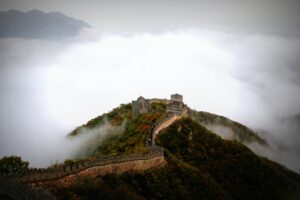What is so special about the Great Wall of China
An insight to the Great Wall of China
When you hear the phrase “The Great Wall of China,” what comes to mind? A colossal stone structure winding its way across mountain ranges, perhaps? Or tales of ancient emperors and mighty warriors defending their lands? The Great Wall is much more than a historical artifact; it’s a symbol of perseverance, ingenuity, and cultural pride. But what exactly makes this wonder so special? Let’s take a journey—in a friendly and relatable way—to uncover the secrets of this awe-inspiring marvel.
It’s Not Just One Wall—It’s Many Walls
Did you know that the Great Wall is not a single, continuous wall? It’s actually a series of walls and fortifications built by different dynasties over centuries. Starting as early as the 7th century BCE, various kingdoms in ancient China constructed walls to protect their territories from invasions.
The most famous sections we see today were built during the Ming Dynasty (1368–1644), stretching over 13,000 miles. That’s right—if you combined all the walls built throughout history, it would be long enough to circle the earth halfway! Knowing this makes visiting the wall feel like stepping into a timeline of China’s history.
It’s a Symbol of Human Ingenuity and Determination
Building the Great Wall was no small feat. Imagine constructing a massive structure across rugged mountains, deserts, and forests without modern machinery. Workers used whatever materials were locally available: stones, tamped earth, wood, and later, bricks. Some sections even used sticky rice as a binding agent—talk about innovative!
The sheer effort that went into building the wall speaks to the determination of the Chinese people. Laborers, soldiers, and even prisoners worked tirelessly, often in harsh conditions. It’s a testament to human resilience and the lengths people will go to protect what matters to them.
The Views Are Simply Breathtaking
If you’re a fan of stunning landscapes, the Great Wall won’t disappoint. Whether you’re visiting the popular Badaling section or the wilder Jiankou stretch, the views are nothing short of spectacular. Imagine standing atop the wall, gazing out at endless mountain peaks or rolling hills. It’s a moment that makes all the huffing and puffing to get there totally worth it.
Pro tip: Visit during sunrise or sunset for an extra dose of magic. The soft light enhances the beauty of the landscape and creates a serene atmosphere you won’t soon forget.
It’s Packed with Legends and Stories
The Great Wall isn’t just a physical structure; it’s also a treasure trove of fascinating tales. One of the most famous legends is the story of Meng Jiangnu. According to the tale, Meng’s husband was forced to work on the wall and tragically died. Her tears were so powerful that a section of the wall collapsed, revealing his remains.
While this is just a story, it reflects the human cost of constructing the wall. Visiting the Great Wall feels like connecting with the countless lives that shaped its history, each one leaving an indelible mark.
It’s a UNESCO World Heritage Site
The Great Wall of China earned its UNESCO World Heritage status in 1987, solidifying its place as one of the world’s greatest cultural landmarks. This designation recognizes not only its architectural significance but also its role in shaping Chinese identity.
Being part of such a globally celebrated list makes walking along the Great Wall feel even more special. You’re not just visiting a historical site—you’re stepping onto a symbol of cultural pride and heritage that has inspired millions around the globe.
It’s More Accessible Than You Think
You might think visiting the Great Wall involves scaling treacherous cliffs or embarking on a multi-day trek. While adventurous sections like Jiankou are indeed challenging, other parts, like Badaling and Mutianyu, are surprisingly accessible. These sections have been restored and even include cable cars for those who prefer a more leisurely experience.
Whether you’re a seasoned hiker or just looking for a casual day trip, there’s a section of the wall that’s perfect for you. The key is to plan ahead and choose the part that matches your comfort level and interests.
It’s a Photographer’s Dream
Calling all Instagram enthusiasts! The Great Wall offers endless photo opportunities. The juxtaposition of ancient architecture against dramatic landscapes makes for striking compositions. Don’t forget to capture the small details too, like the watchtowers or the intricate patterns of the bricks.
For the best shots, venture to less crowded sections like Jinshanling or Simatai. And if you’re lucky enough to visit in winter, you’ll be treated to a snowy wonderland that adds a whole new layer of beauty.
It’s a Great Workout (Literally)
Who needs a gym when you have the Great Wall? Climbing its steep steps and uneven pathways is a workout in itself. Some sections, like the infamous “Heavenly Ladder” at Jiankou, are so steep they’ll leave your legs shaking—but in the best way possible.
Think of it as a way to combine fitness and adventure. And hey, those stunning views are a pretty great reward for all your hard work!
It Brings People Together
One of the most special aspects of the Great Wall is its ability to unite people from all walks of life. Every year, millions of visitors from around the world come to marvel at its grandeur. Whether you’re sharing a laugh with fellow travelers or exchanging a smile with locals, the wall fosters a sense of connection and shared wonder.
There’s something humbling about standing on a structure that has endured for centuries, surrounded by people who, like you, are in awe of its magnificence.
So, what’s so special about the Great Wall of China? It’s a living testament to human ingenuity, a keeper of stories, and a source of inspiration for generations. Whether you’re marveling at its architecture, soaking in the views, or reflecting on its history, the Great Wall leaves an impression that’s hard to shake.
